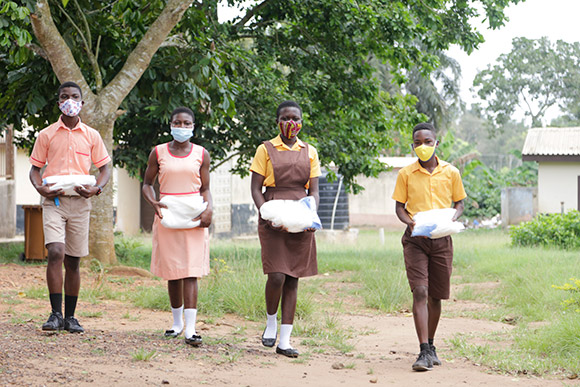
School pupils displaying ITNs. Photo: Jeffrey Buta
In November 2020, the US President’s Malaria Initiative (PMI), through the VectorLink project, distributed 1,175,249 insecticide-treated nets (ITNs) during a school-based distribution (SBD) in 26,080 public and private basic schools in Ghana (basic schools represent education levels from kindergarten to junior high school). These nets were bulk packed to mitigate the effect of a large number of individual plastic waste bags on the environment. The ITNs only had a light plastic covering around the portion of the net containing the piperonyl butoxide (PBO) synergist which could be stretched to cover the entire net.
Until the distribution of the bulk packed PBO nets, all nets distributed through schools were individually packaged, leading to a large volume of plastic bags. Schools were required to manage the empty bales that were used to transport the ITNs from manufacturers (usually 50 ITNs to a bale) and households were expected to manage the individual plastic bags in which ITNs were packed. For the 2020 SBD, pupils were asked to come to school with a receptacle (that was already being used at their household) to receive the new PBO ITNs. This was to protect pupils from the possible side effects that can occur from the handling of new ITNs (such as itching and burning sensation). Some pupils responded to this call and came to school with receptacles to carry their ITNs back to their household. Many others, however, did not and some schools had to procure plastic bags for their pupils to carry their nets: a practice that defeated the strategy of bulk packaging to minimize plastic waste during this SBD.
Managing plastic waste has for some time been part of Ghana’s SBD strategy to reduce environmental degradation. Teachers, parents and pupils are educated on the negative effects of plastic waste on the environment and the need to practise safe disposal of the waste in accordance with the WHO recommendation of deep burying (far from water sources). The 2020 school-based ITN distribution undoubtedly reduced the amount of plastic waste (the exact volume is not known) by procuring bulk packaged nets and having students bring their own receptacle. For future distributions, additional social and behaviour change activities (including building capacity at the school and household through training, tools and materials) that combine malaria and positive ITN use, care and maintenance behaviours with environmental protection, can help reduce this waste even further.
